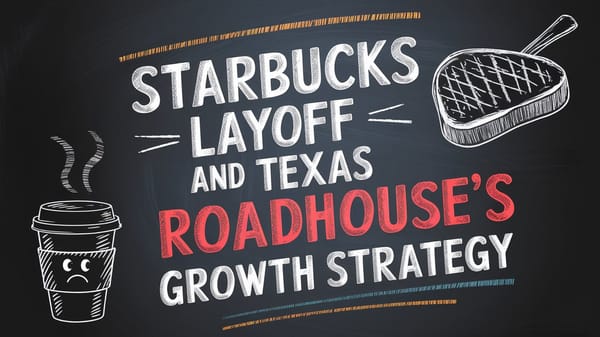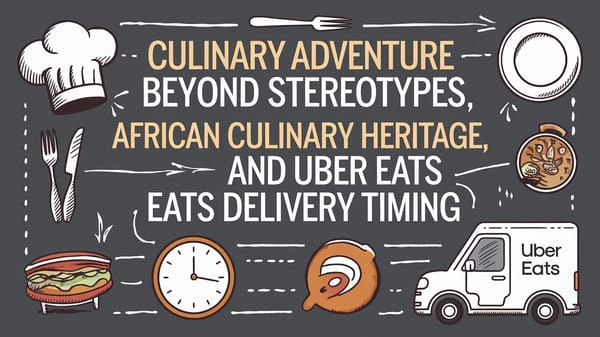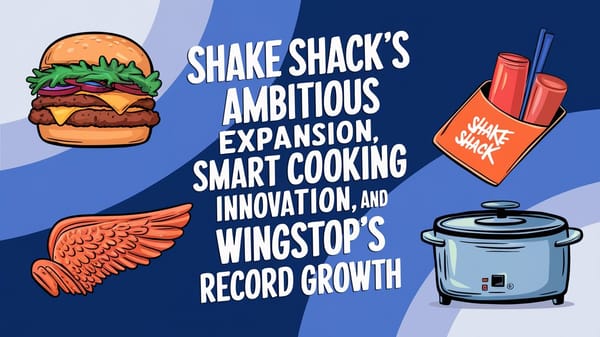October 24th QSR Roundup: New CMOs, Cookie Launches, and a Tainted Burger Dilemma
QSR news for Oct 24th, 2024. We reviewed 21 QSR publications, 6 subreddits, and over 70 articles to bring you the latest. Estimated reading time saved (at 200wpm): 195 minutes. It'll take you only 14 minutes to catch up.
Leadership Changes and New Appointments
Red Lobster's New CMO
Red Lobster has appointed Nichole Robillard as its new Chief Marketing Officer. Robillard, with over 20 years of experience and previously CMO at Smokey Bones, will lead marketing, communications, and culinary teams. CEO Damola Adamolekun praises her creative vision and operational expertise, crucial for revitalizing the brand post-bankruptcy. This marks the second executive hire in a week, with Bob Baker named CFO earlier. The chain aims to reconnect with lapsed customers and attract new audiences as part of its turnaround strategy.
Sources: Nation's Restaurant News, Restaurant Business
Denny's Restaurant Closures and Transformation
Denny's Corp. is undergoing significant changes, having closed 75 out of 150 underperforming locations to optimize its portfolio. The goal is to raise average unit volumes from $1.9 million to $2.2 million. CEO Kelli Valade highlights the return of the $2-$4-$6-$8 value menu and new openings for Keke's with expanded drink offerings. Financially, Denny's reported a net income drop to $6.5 million in Q3, alongside a slight dip in systemwide same-store sales by 0.1%. As of late September, the company operates 1,586 restaurants across its brands.
Sources: Nation's Restaurant News
QDOBA Appoints New COO
QDOBA has named Kevin Carroll as its new Chief Operating Officer. With previous experience as COO at Applebee's and 27 years at Chili's, Carroll will oversee operations for 800 locations in North America. The fast-casual Mexican chain plans to double its restaurant count to over 1,600 in the next ten years, and Carroll's leadership is expected to be pivotal in achieving this expansion.
Sources: Foodservice Equipment & Supplies
Another Broken Egg Café Welcomes New CFO
Brad Cameron has been appointed CFO of Another Broken Egg Cafe amid rapid expansion, surpassing 100 units this year. With over 20 years of experience, including roles at Bloomin’ Brands and FAT Brands, Cameron aims to enhance financial performance, support franchise growth, and optimize investment strategies. CEO Paul Macaluso believes Cameron's expertise will significantly benefit their growth efforts.
Sources: FSR Magazine
Layne's Chicken Fingers Expansion
Layne's Chicken Fingers opened a new location in Janesville, Wisconsin. Founder Mike Garratt expressed pride and emotion at the expansion, which reflects the brand's growth beyond Texas. Key facts include:
- 17 restaurants currently open with agreements for 209 more.
- Achieved an 11% increase in same-store sales compared to 2023.
- The Janesville location is owned by franchisees Randy Bergeson and his sons.
Chief Operating Officer Samir Wattar emphasized the incredible growth over just a few years since the brand’s founding in 1994 in Texas.
Sources: QSR Web
Food Safety Concerns and Legal Challenges
McDonald's E. Coli Outbreak and Response
An E. coli outbreak linked to McDonald's Quarter Pounder hamburgers or their onions has resulted in 49 illnesses across 10 states and one death. The CDC suggests the problem stems from slivered onions used on the burgers, leading to their removal in states like Colorado, Kansas, and Utah. McDonald's supplier, Taylor Farms, has recalled yellow onions as a precaution, despite not finding E. coli traces. Other chains, such as Illegal Pete's and Taco Bell in Colorado, have also removed onions due to contamination fears. The outbreak has led to a stock drop of over 5% for McDonald's, sparking concerns reminiscent of past food safety issues faced by brands like Chipotle.
Sources: Nation's Restaurant News, Restaurant Business, Restaurant Dive
Senators Challenge McDonald's Pricing
Three U.S. senators—Elizabeth Warren, Bob Casey, and Ron Wyden—are questioning McDonald's over significant price hikes that outpace inflation, asserting that the company is enriching shareholders at the expense of consumers. Key points include:
- McDonald's net income soared by 79% since 2020, while prices increased more than the overall 20% inflation.
- The company defends its pricing, citing rising operational costs—food and labor costs jumped about 40%.
- The price of a Big Mac rose by 21% from 2019 to 2023.
- McDonald's has introduced a new $5 meal bundle to appeal to budget-conscious diners amid a 0.7% drop in same-store sales.
- The inquiry coincides with an E. coli outbreak linked to McDonald’s affecting nearly 49 individuals, with one fatality.
Sources: Restaurant Business, Restaurant Dive
Pizza Hut Drivers Win Settlement
A Pizza Hut franchisee has agreed to a $4.75 million settlement over a lawsuit alleging underpayment of delivery drivers across multiple states. Highlights include:
- Drivers claimed they were not fairly reimbursed for vehicle-related expenses, effectively earning below minimum wage.
- Over 1,000 drivers from 321 locations are included, covering those who worked between June 21, 2019, and September 27, 2021.
- The settlement allows eligible drivers to claim compensation, addressing a series of legal challenges regarding delivery driver wage practices and Fair Labor Standards Act compliance.
Sources: Restaurant Dive
New Product Launches and Innovations
Subway's Festive Footlong Cookie
Subway is celebrating the holiday season by introducing the Double Chocolate Peppermint Footlong Cookie, available from November 1 through December 31. This indulgent treat features rich chocolate dough mixed with chocolate and white chocolate chips, infused with peppermint, and topped with candy cane pieces. Priced at $5 or under, it's designed to delight customers during the festive period. Since launching the original Footlong Chocolate Chip Cookie, Subway has sold over 10 million across the country. This new offering reflects Subway's commitment to providing unique and seasonal options to its customers.
Sources: Nation's Restaurant News, QSR Magazine, Restaurant Business
Wendy's Halloween Deals
Wendy's is spicing up Halloween with a series of limited-time digital deals available through its app from October 28 to October 31:
- Monday, 10/28: Buy any breakfast sandwich, get a second one free with the BoooGO offer.
- Tuesday, 10/29: Free small chocolate Frosty with any purchase.
- Wednesday, 10/30: Free small coffee with any purchase.
- Thursday, 10/31: Free 4-piece Saucy Nuggets with purchase, featuring flavors like Spicy Ghost Pepper.
Additionally, any size soft drink is just $1, and Boo! Books are available for $1, containing coupons for five free Jr. Frosty treats, supporting the Dave Thomas Foundation for Adoption.
Sources: QSR Magazine
Buffalo Wild Wings Introduces New Sauces
Buffalo Wild Wings has launched two new limited-time sauces:
- Maple Chipotle: A blend of rich sweetness and mild smoky heat.
- Cajun: Combines robust Cajun spices with spicy and tangy pepper flavors.
These new flavors are available on wings, tenders, sandwiches, and wraps. Chief Marketing Officer Tristan Meline emphasizes the uniqueness and craveability of these offerings. Special deals include 20 boneless wings and large fries for $16.99 and the 'Pick 6' deal (two entrees, two sides, two drinks) for under $20.
Sources: FSR Magazine
Mike Tyson Invests in Vegan Fast-Food Chain
Former heavyweight boxing champion Mike Tyson has invested in Mr. Charlie's, a vegan fast-food chain known for its playful mimicry of McDonald's. The brand offers plant-based meals and focuses on job creation for marginalized individuals, including those reentering the workforce from prison or homelessness. Operating in Los Angeles, San Francisco, and soon Sydney, Australia, Mr. Charlie's aims to expand globally. Tyson, a vegan himself, resonated with the mission of giving people second chances. Despite challenges faced by other plant-based chains, the brand's unique positioning and Tyson's star power are seen as key differentiators.
Sources: Restaurant Business
&Pizza's Controversial Dessert Removal
&Pizza faced immediate backlash after introducing the Marion Berry Knots, a dessert marketed with drug-related imagery and references to former DC Mayor Marion Barry, a civil rights activist. The product offended many, prompting the NAACP DC to criticize the brand for its insensitivity and calls for a boycott. CEO Michael Lastoria apologized for misjudging the humor in the campaign, and the item was swiftly removed from the menu.
Sources: Restaurant Business
AI and Technology Revolutionizing Restaurants
AI Enhancing Drive-Thrus and Customer Experience
Restaurants are increasingly adopting AI technology to improve operations and customer satisfaction. Key developments include:
- Digital Menu Boards: Allowing for real-time updates and dynamic pricing, enhancing customer engagement. Wendy's is investing $20 million to implement these across its corporate stores by 2025. Burgerville plans to convert all drive-thrus to digital boards, highlighting their success in improving the customer experience.
- AI-Powered Ordering: Checkmate secured $10 million in Series B funding to enhance its AI-driven phone and drive-thru ordering services. The system manages 95% of orders without human help, reducing errors and increasing efficiency.
- Chipotle's AI Hiring Platform: Chipotle introduced Ava Cado, an AI platform that simplifies and automates hiring for over 3,500 restaurants, reducing employee hiring time by up to 75%. It engages candidates through multilingual chat and schedules interviews in real-time, supporting the company's expansion goals to 7,000 locations.
- AI in Inventory Management: PAR Technology and NomadGo have partnered to transform restaurant inventory management using AI. Their integration promises counts happening up to 10 times faster with 99% accuracy, saving up to 15 hours per month per restaurant.
- AI Revolutionizes Forecasting: Crunchtime integrated a custom AI forecasting engine to aid restaurant sales and operations management. CEO John Raguin highlights drastic improvements, with forecasts coming within just 13 cents of actual sales. Testing showed an accuracy increase of up to 27%.
Sources: Nation's Restaurant News, Restaurant Business, Restaurant Dive, Fast Casual
AI's Impact on Energy Consumption
AI and data centers are anticipated to double global energy demand by 2026, compounded by higher electrification in vehicles and buildings. This surge could drive up electricity prices due to market scarcity and increased fuel costs. Restaurant owners are urged to embrace energy efficiency strategies, including:
- Benchmarking energy usage.
- Setting clear goals.
- Collecting and analyzing data.
- Implementing actionable strategies to lower consumption and costs.
By prioritizing energy efficiency, restaurants can significantly reduce operating expenses while promoting sustainability.
Sources: Modern Restaurant Management
Industry Trends and Insights
Election Day Impacts on Restaurants
On Election Day, November 5, Americans will decide key state-level issues affecting restaurant operators, beyond the presidential election. Key topics include:
- Minimum Wage
- Tipped Wages
- Paid Sick Leave
- Marijuana Legalization
Nine states are voting on relevant issues, making it critical for business owners to stay informed about potential changes that could impact labor costs and regulations.
Sources: Nation's Restaurant News
Gen Z's Lunch Habits
The pandemic has radically transformed workplace dynamics, diminishing the significance of lunch breaks, especially among Gen Z. Key findings highlight that:
- 47% of Gen Z workers miss lunch at least twice a week, with 75% stating their break time is often consumed by additional tasks.
- Remote work has led to an average increase of 48.5 minutes worked each day, squeezing out lunch breaks.
- 78% of employees report changes in lunch spending habits due to rising costs from inflation.
- Recent controversies at Meta highlight tensions around meal vouchers being misused for personal items instead of meals, sparking a debate on work-life balance.
Sources: Salon
Food Distribution Insights
Understanding the nuances of food distribution is crucial for those in the industry:
- Food Distribution vs. Food Delivery: Food distribution involves wholesale transactions supplying businesses, whereas food delivery serves consumers directly.
- Essential Services: Include bulk deliveries, product sourcing, inventory management, and training programs.
- Market Overview: Over 27,400 companies in the U.S. specialize in food distribution, with Sysco leading as the largest broadline distributor.
- Emerging Trends: A push towards sustainable products and advanced software integration to minimize waste and improve efficiency.
Sources: BlueCart
B Corp Certification in Restaurants
B Corp Certification reflects a restaurant's commitment to sustainability, social responsibility, and ethics. Key points include:
- Nearly 150 restaurants are certified, such as Sleepy Bee Cafe and Hog Island Oyster Company.
- Certification involves rigorous assessments in areas like Governance, Workers, Community, Environment, and Customers.
- Achieving B Corp is challenging due to cost and operational constraints but can enhance brand authenticity, help build community ties, and attract conscious consumers.
- It requires ongoing certification demands and may present uncertainties in ROI but offers a competitive edge in aligning with consumer values.
Sources: Modern Restaurant Management
Franchise Expansions and Milestones
Stoner's Pizza Joint Celebrates 50th Location
Stoner's Pizza Joint has opened its 50th restaurant in San Marcos, Texas, marking a significant milestone. The brand has launched 16 new locations this year and projects over $50 million in sales for 2025. CEO John Stetson highlights this achievement as a testament to their dedicated franchisees. San Marcos owner Tobbie May praises the support from the Stoner's team that has fueled their growth.
Sources: QSR Web
Rock N' Roll Sushi Expands into Walmart
Rock N' Roll Sushi is set to open its 13th location in Florida inside a Walmart Supercenter in Niceville, marking the chain's 73rd outlet overall. Owner Adam Alfonso emphasized the opportunity as too good to ignore, likening the experience to how sushi lovers already purchase their favorites from grocery stores. The innovative approach aims to provide an improved sushi experience, staying true to the brand's rock n' roll ethos.
Sources: Fast Casual
Layne's Chicken Fingers Continues Expansion
Layne's Chicken Fingers has opened a new location in Janesville, Wisconsin, showcasing their commitment to community and growth. Founder Mike Garratt expressed pride and emotional connection during the opening, stating this expansion exceeds his original vision of remaining localized. With 17 open restaurants and 209 additional agreements, Layne's has demonstrated significant success, including an 11% increase in same-store sales this year. Franchisees Randy Bergeson and his sons now own the Janesville location, reflecting the brand's collaborative spirit and appeal.
Sources: QSR Web
Restaurant Closures and Financial Struggles
Shari's Café & Pies Closes Remaining Oregon Locations
Shari's Café & Pies has permanently shut down its remaining locations in Oregon due to financial difficulties. After reducing its locations from 42 to 17 over the past year, CEO Sam Borgese expressed gratitude to employees for their hard work amid challenges. Founded in 1978, Shari's had peaked at 95 locations but has struggled financially, facing unpaid bills and eviction notices. Despite a recent investment meant to stabilize operations, the closure marks the end of an era for this regional dining institution. Some locations remain open in California, Washington, and Idaho.
Sources: Nation's Restaurant News
Frisch's Big Boy Faces Eviction
More than 20 Frisch's Big Boy restaurants are at risk of eviction due to over $4.5 million in unpaid rent after breaches of lease agreements were filed by landlord NNN REIT. Frisch's seeks a court delay to negotiate a more employee-friendly closing schedule. Currently, 54 units remain open, with the potential closure cutting the brand nearly in half. The company has experienced leadership changes, including the former CEO transitioning to a new role. Frisch's brand is owned by NRD Capital, which also owns Experiential Brands.
Sources: Restaurant Business, FSR Magazine
Struggles of Closing a Restaurant
An owner shared on Reddit their emotional struggle with the potential closure of their restaurant after facing a year of declining sales, high rent, and damaging loans affecting cash flow. Key points include:
- Mixed emotions about closing, feeling like a failure but hopeful for a fresh start after a much-needed vacation.
- High operational costs and equipment failures impacting profitability, despite great food and loyal customers.
- Consumer spending habits affected by inflation leading to decreased dining out.
- Supportive community offering encouragement and practical advice, such as re-evaluating lease agreements and exploring alternative business models.
- Emphasis on the importance of mental health and recognizing that closing a restaurant can lead to new opportunities.
Sources: /r/restaurateur
Customer Experience and Hospitality
Evolution of Hospitality with Technology
Modern hospitality in restaurants emphasizes convenience and a seamless experience through tech innovations:
- Whataburger's Digital Kitchen: The chain's first digital kitchen eliminates on-site dining and prioritizes speed and efficiency, exemplifying the shift towards tech-driven service.
- Automated Pickup Solutions: Enhance employee-customer interactions by reducing order handling with smart lockers, leading to clearer processes and boosting employee satisfaction and consumer confidence.
- Smart Restaurants: Integrate AI and robotics into operations for improved food quality and customer interactions, with AI-driven personalized menus tailored to customer preferences as a future possibility.
- Balancing Tech with Hospitality: Restaurants must focus on maintaining essential hospitality principles while innovating to enhance the overall experience.
Sources: QSR Magazine
AI's Impact on Energy Consumption
AI and data centers are anticipated to significantly increase global energy demand, with projections indicating a doubling by 2026. Restaurant owners are encouraged to adopt energy efficiency strategies to mitigate rising electricity prices due to increased demand and market scarcity. Strategies include:
- Benchmarking energy usage.
- Setting clear energy goals.
- Collecting and analyzing data.
- Implementing actionable plans to reduce consumption.
By prioritizing energy efficiency, restaurants can reduce operating expenses while promoting sustainability.
Sources: Modern Restaurant Management
Stay tuned for more concise news updates delivered right to your fingertips, saving you valuable time. As industry professionals and restaurant operators, your time is precious—spent on running your businesses, innovating menus, and enhancing customer experiences. Let us keep you informed with quick, comprehensive summaries so you can focus on what you do best. Subscribe now and join us again for the latest insights in the restaurant industry!




